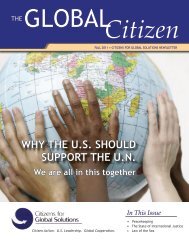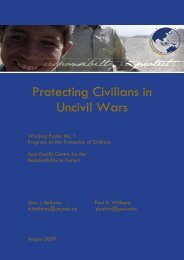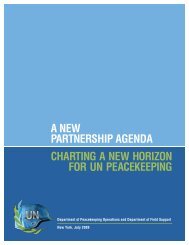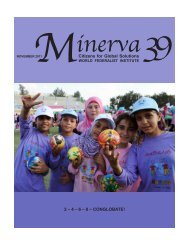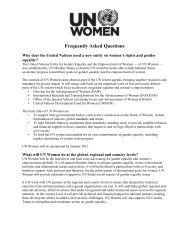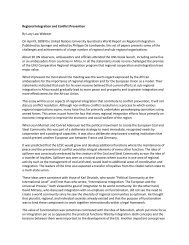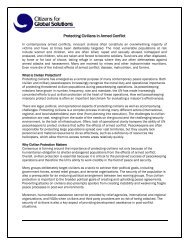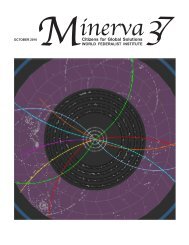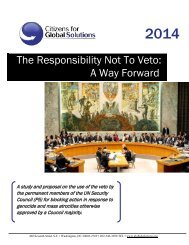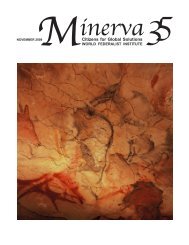Minerva, Spring 2008 (Volume 32) - Citizens for Global Solutions
Minerva, Spring 2008 (Volume 32) - Citizens for Global Solutions
Minerva, Spring 2008 (Volume 32) - Citizens for Global Solutions
Create successful ePaper yourself
Turn your PDF publications into a flip-book with our unique Google optimized e-Paper software.
ut it has different colors. One could say<br />
that this book is all about reframing world<br />
federalism in a way that is most relevant<br />
to Americans today.<br />
The title is <strong>Global</strong> Democracy. It could<br />
have been World Federalism instead, but I<br />
chose not to use that title <strong>for</strong> the same reasons<br />
that the World Federalist Association<br />
changed its name to <strong>Citizens</strong> <strong>for</strong> <strong>Global</strong><br />
<strong>Solutions</strong>. The sub-title gives the new<br />
frame through which I write about world<br />
federalism. It is: The Struggle <strong>for</strong> Political<br />
and Civil Rights in the 21st Century.<br />
World federalism is a civil rights issue.<br />
The usual frame <strong>for</strong> world federalism is<br />
the creation of a world government. But<br />
very few people think they want a world<br />
government. To most people, world government<br />
sounds scary, overbearing, authoritarian.<br />
On the other hand, everybody<br />
supports civil rights. Nobody is going to<br />
argue against them. So if we manage to<br />
frame world federalism as a civil rights<br />
issue, we have made a major breakthrough.<br />
How do I manage to frame world federalism<br />
as a civil rights issue? It is very easy:<br />
I assert that we already have world government.<br />
World government is not utopia. It is reality.<br />
World government is not futuristic. It is<br />
history; it is a part of our historical heritage.<br />
How come we have not noticed? We have<br />
not noticed the existence of our world<br />
government because the United Nations<br />
system does not quite look like other governments<br />
we are familiar with. There are<br />
many kinds of governments.<br />
Our world government is not a communist<br />
regime like Cuba. It is not an absolute<br />
monarchy cum theocracy like Saudi Arabia.<br />
It is not a medieval empire, although<br />
it has some resemblance to that: it has a<br />
Byzantine structure. Its authority is contested<br />
in many parts of the world. And its<br />
geographic boundaries are not clear, as<br />
some countries are members of one international<br />
institution but not the other.<br />
Our world government is not a liberal<br />
democracy either, although again it has<br />
some resemblance to it: the UN system<br />
respects freedom of speech and association.<br />
It consists of modern bureaucracies.<br />
The United Nations system is none of the<br />
above and yet it is a government in the<br />
simple sense that it is an organization that<br />
does public policy. That is my definition<br />
of a government anyway: an organization<br />
that does public policy.<br />
The World Trade Organization, <strong>for</strong> instance,<br />
has adopted 30,000 pages of legal<br />
text, which its member-states must respect<br />
in their entirety. These pages contain very<br />
precise economic regulations that greatly<br />
influence national economies. The WTO<br />
even has a quasi-judicial body to arbitrate<br />
disputes of implementation, and can take<br />
sanctions against states that do not respect<br />
the rules. Why on earth don’t we call that<br />
a federal world government? Or a branch<br />
of it, anyway.<br />
I suggest the following thought experiment.<br />
Let us imagine a moment that the<br />
United Nations General Assembly was<br />
directly elected by the people. And let’s<br />
assume that it had co-decision power on<br />
all matters currently dealt with by the UN<br />
Security Council, the WTO, the IMF and<br />
the World Bank. So all the decisions that<br />
these bodies now make would also need<br />
to be approved by the directly-elected<br />
General Assembly.<br />
I think that if that were the case most<br />
people in the streets would agree that, of<br />
course, we have a world government, and<br />
Joe Blogh is my representative. Everything<br />
else in the UN system could remain<br />
the same. If only there were elections,<br />
people would recognize their world government,<br />
because the concept of elections<br />
is very closely associated with the concept<br />
of government.<br />
But of course, not all governments are<br />
elected. What we have is a world government<br />
that is not democratic. It is an apartheid<br />
regime. We live under global apartheid.<br />
Americans and Europeans make<br />
decisions, and the rest of the world must<br />
follow the rules, without voice. That is<br />
plainly unfair, and here is where the civil<br />
49 • <strong>Minerva</strong> #<strong>32</strong> • June <strong>2008</strong><br />
and political rights frame comes into the<br />
picture.<br />
So my book is about the struggle <strong>for</strong> political<br />
equality in the 21st century. The<br />
struggle <strong>for</strong> nationals of poor nations to<br />
have equal say in decisions that affect all<br />
humankind. There are global policies on<br />
trade, on climate change, on nuclear proliferation<br />
and so on and so <strong>for</strong>th. I claim<br />
that these policies should be decided according<br />
to the “one person, one vote” rule.<br />
And I argue that it is realistic to expect<br />
that to happen by the end of this century.<br />
I compare this struggle with previous<br />
civil rights struggles, such as the movements<br />
<strong>for</strong> women’s suffrage in the 19th<br />
and early 20th centuries, or the working<br />
class movement <strong>for</strong> suffrage around the<br />
same period, or the struggle to end apartheid<br />
in South Africa.<br />
In the first part of the book, I criticize<br />
current political science on the subject of<br />
global governance. I discuss concepts like<br />
governance and government, democracy,<br />
federalism and confederalism, or sovereignty,<br />
and define them in ways that allow<br />
us to view the world through a whole new<br />
frame, the frame of global democracy.<br />
In the second part, I present a picture of:<br />
• how our world government could democratize<br />
incrementally in the coming<br />
century,<br />
• how that would improve its effectiveness<br />
to cope with this century’s global<br />
challenges,<br />
• and, last but not least, what political<br />
<strong>for</strong>ces could drive the democratization<br />
process.<br />
Tad Daley tells of the East Berliners who,<br />
back in 1983, imagined a future without<br />
wall a hundred years later. Back in 1983,<br />
it was impossible to discern the political<br />
<strong>for</strong>ces that would lead to the collapse of<br />
the Berlin Wall only six years later. But<br />
today, it is possible to discern the political<br />
<strong>for</strong>ces that might bring about global<br />
democracy, and that is the story I tell in<br />
the book.<br />
For sixty years, the goals of the world<br />
federalist movement have been the cre-



